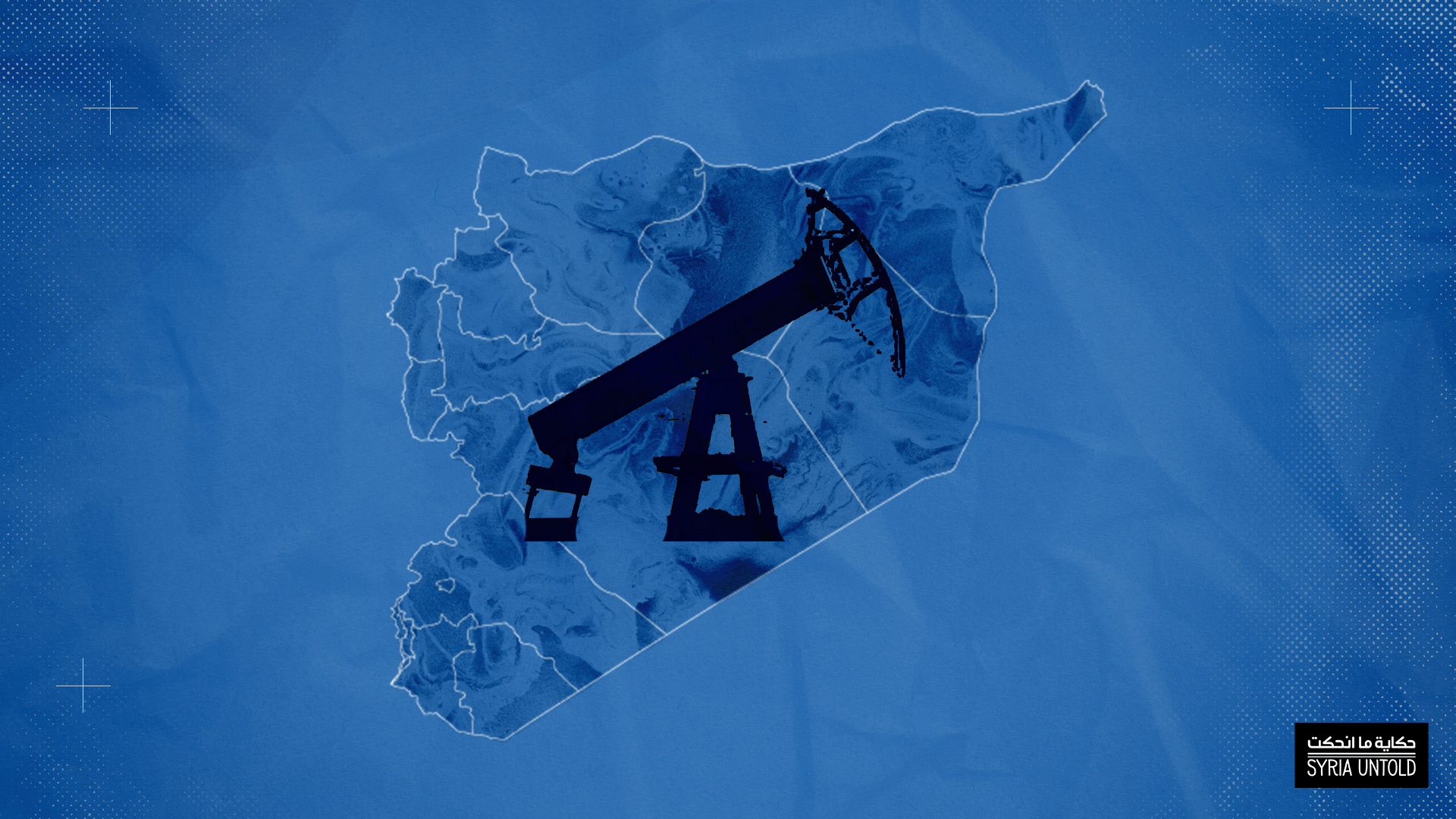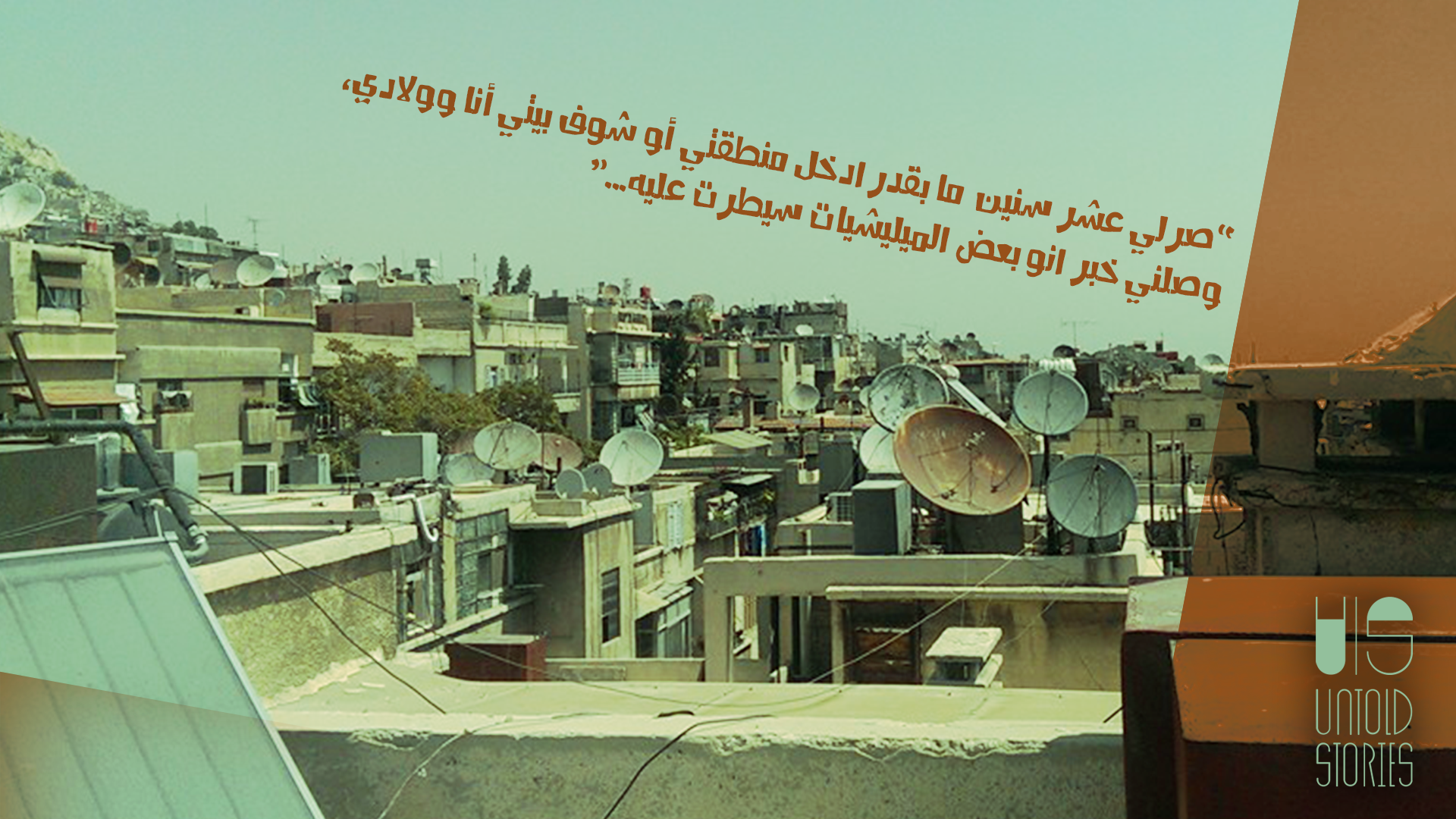“This article was produced within the project «Empowering the Next Generation of Syrian Women Journalists» in partnership between the «Syrian Female Journalists Network» and «UntoldStories». This article was produced under the supervision of journalist Zeina Bitar.”
He wanted to pursue his dreams like all other children, but the worsening of his family’s living conditions and the related difficult circumstances prevented that from happening. Mahmoud Al-Eido (a pseudonym) was only fifteen when he fled the city of Ma’arat Al-Nu’man in southern Idlib with his family to the Mashhad Ruhin camp in the north at the end of 2019. He loved maths and adored numbers, and aspired to become an engineer. However, he left school, let go of his goals, and replaced his books and pens with a rifle after volunteering to fight with one of the warring factions, hoping to help his family secure some of life’s basic needs.
Mahmoud is one of hundreds of children who left school in Syria to join the war or engage in dangerous activities in Idlib, which is under the control of “opposition” groups. In this governorate, where approximately three million people live, the security situation is calamitous, with ongoing clashes and bombardments by the Syrian regime and its allies.
A statement on child labor published by the Syria Response Coordinators group in June 2023, indicated that the number of Syrian children dropping out of school has exceeded 2.5 million. In north-western Syria alone, more than 318,000 children are drop-outs, with over 78,000 children currently residing in refugee camps. Out of those, 85% are employed, often in unsafe jobs.
The statement also highlighted that the dropout rate and shift towards employment affects two out of five children, with expectations that this percentage will increase over the next three years due to ongoing hardships.
Arming Children
Thousands of children around the world are recruited in armed conflicts as “child soldiers”, who endure widespread exploitation and mistreatment. In the Northern Syrian governorate of Idlib, Hay’at Tahrir Al-Sham group, which controls the region, encourages children to join its ranks, through taking advantage of their poor economic conditions and the limited opportunities available to them.
Another statement from the Syria Response Coordinators team revealed the different hardships faced by civilians in north-western Syria during August 2023. The percentage of families living below the poverty line reached 90.93%, while 40.67% of families are in a state of hunger. Furthermore, unemployment rates among civilians were exceptionally high, reaching 88.65%.
Mahmoud, tall and blond, volunteered with Hay’at Tahrir Al-Sham for about a year. His neighbours became used to seeing him in a military uniform. When asked why he chose to volunteer, he answered: “My dad is a day labourer and often cannot find work. So, I decided to help him through the monthly salary I receive. Since I am the oldest male child, I consider it my duty to help him and contribute to cover my family’s expenses.”
The number of Syrian children dropping out of school has exceeded 2.5 million. In north-western Syria alone, more than 318,000 children are drop-outs.
Mahmoud also shares that, after joining the faction, he underwent two religious courses where he received lessons on the importance of combat and the desire for death over life. In addition, he was trained on how to handle a weapon and other military tactics, including shooting, bomb detonation, mine handling and more. He affirms that the training course was extremely difficult. Subsequently, the young boy was assigned to guard duty on one of the fronts, within a group of 15 youngsters, including two children close to his age.
Al-Eido states that he was in 7th grade when he left school for work, and that his current job is extremely dangerous. “When I leave my family for guard duty, I feel like I may be seeing them for the last time,” he says. “But, I have no other choice. Circumstances have forced me to seek work and abandon school, which I was attached to. Nowadays, studying is a privilege only for those who are well-off.”
The young man receives a monthly salary of a mere 50 USD dollars which barely covers his family’s basic needs. However, it is better than nothing in the face of the deteriorating conditions they are going through.
Mahmoud recalls the death of his friend and the injury of two others due to shelling near them. “We were monitoring one of the fronts when a shell fell just meters away from us. Shrapnel led to his death and injured two others. I miraculously survived.”
In an interview with his mother, she told us about the impact militarization had on her son’s behaviour. After carrying weapons, Mahmoud became “a moody smoker who constantly defies his father, physically abuses his younger sisters and prevents them from leaving the house. He also forced his 16-year-old sister to quit school and give up her right to education, out of his concern for her safety.”
His mother mentioned that he left home after a minor dispute with his father and did not return for a whole week. She thought he was staying with some relatives, but it turned out that he had joined a faction affiliated with Hay’at Tahrir Al-Sham, “seeking money, a desire for influence, power, and the intimidation of others.”
Deciphering the competition for Syrian oil: Part one
18 October 2021
Deciphering the competition for Syrian oil: Part two
25 March 2022
On the other hand, Khadija Al-Adnan (a pseudonym for a 38-year-old woman displaced from the city of Khan Sheikhoun to Idlib) managed to smuggle her only 16-year-old son to Turkey to prevent him from being recruited. She also shares that her son’s fighter friends within the ranks of Hay’at Tahrir Al-Sham convinced him to join them “to earn money on one hand and experience the joys of victory on the other. However, I was not comfortable with him joining at this age.”
Al-Adnan recalls that she borrowed money from a relative to send her son to Turkey and free him from this dangerous type of work because he is “still too young to carry weapons and fight on the front lines.”
She also explains that poverty and her husband’s cancer pushed her son to leave school and seek work to earn money. During our conversation, she makes a point that Hay’at Tahrir Al-Sham “exploits the needs of our children and their difficult circumstances to recruit them to fight. We don’t even have the right to object.”
Searching for Life in the Profession of Death
Children in Idlib are also engaged in other activities that are no less dangerous than holding arms, such as collecting war remnants to sell them and benefit from the proceeds.
Thirteen-year-old Said Al-Junaid, who fled with his family from Khan Sheikhoun in southern Idlib to the city itself, works in collecting scraps, including war fragments. He considers this work as his only source of income. With his face showing signs of fatigue and exhaustion, he shares: “I roam the streets and garbage dumps with two of my friends to collect anything that can be sold. We also visit destroyed houses and agricultural lands to gather iron, shell remnants and missile debris.”
Al-Junaid explains that they sometimes come across unexploded or partially exploded shells. They then take them to specialists to separate the gunpowder from the iron. “I sell each of them separately,” he says. “The iron goes to assembly workshops, while explosive materials are sold to quarry owners who use them to blast rocks and stones.” Said was forced to start working after his father’s death in an airstrike in 2020, making him the sole provider for his mother and three younger siblings. His mother works intermittently in agriculture, and despite her asthma, she often cannot afford to buy her medicines.
Said is forced to work for more than 12 hours a day without any safety measures instead of going to school like other children because he needed to provide for his family.
In 2022, the Syrian Civil Defence documented 32 war remnants explosions in north-western Syria, resulting in the death of 29 people, including 13 children, and injuring 31 others, including 22 children and one woman. The Civil Defence’s unexploded ordnance removal teams conducted over 1300 non-technical survey operations in more than 430 areas contaminated with artillery. They removed 990 ammunition of various types, including 430 cluster bombs.
Petroleum Burners Choking Children
With a face covered in black spots and worn-out clothes emitting the smell of petroleum, eleven-year-old Abdullah Al-Satouf, displaced from the town of Ahsem in Jabal Al-Zawiya in rural Idlib to Tahrin in northern Aleppo, says: “I was forced to work in this field (primitive burning of petroleum) for long hours despite its dangers to help my elderly father provide for our family of nine.”
Abdullah dreams of returning to the school he left two years ago. “But I have to support my family,” he says.
In 2022, the Syrian Civil Defence documented 32 war remnants explosions in north-western Syria, resulting in the death of 29 people, including 13 children.
Al-Satouf is tasked with cleaning fuel tanks from residue after heating and isolating them. “I go down into the heating tank before it cools down to extract any impurities left inside, despite the high temperature and the foul smells coming from it.”
Young Abdullah hates his work because it causes him continuous coughing and difficulty breathing. Furthermore, he is constantly subjected to verbal abuse and mistreatment. He explains that he receives little remuneration for his work, not exceeding two dollars per day, from the burner’s owner, while older more experienced workers receive four dollars.
The Impact of Strenuous Work on Children
Nour Al-Daghem, psychological counsellor residing in Idlib, talks about the exploitation of a significant percentage of children in exhausting professions, where they receive low daily wages without considering the potential dangers that could lead to illness or even death. In addition, she emphasizes that the labor markets pose a threat to children, subjecting them to abuse and exploitation, while depriving them of their childhood and hindering their ability to enjoy fundamental rights such as education, nutrition, and protection. “This may leave lasting effects on a child’s psychological and physical well-being. He/she may develop aggressive behavior, a sense of despair, and frustration that can delay their psychological growth and deprive them of their basic rights.” She adds that children working in unsafe environments are vulnerable to various forms of bullying and violations, including sexual harassment and financial exploitation.
Syria’s lucrative detainment market: How Damascus exploits detainees’ families for money
13 April 2021
Arduous work does not only affect children’s mental well-being, but extends further to include health risks and physical illnesses, as confirmed by pediatrician Bashar Al-Hussein, based in the city of Dana in northern Idlib. He explained the health risks of child labor, stating that “engaging children in dangerous professions at an early age may cause them back and joint pain, spinal compression, or problems with cartilage, as the child is still in growth stage.” As for injuries resulting from war remnants, the doctor described them as “catastrophic”, often leading to permanent disabilities. Their explosion can result in death or severe injuries that may cause internal organ damage, limb amputation, or the loss of one of the senses. Moreover, he emphasized that working in petroleum burners, fuel stations, and other professions emitting chemical odors may cause respiratory and pulmonary diseases, leading to chronic conditions that delay proper growth.
Role of Civil Society Organizations
Civil society organizations operating in northern Syria are attempting to curb the percentage of children dropping out from schools to pursue work. They face numerous challenges because addressing this issue requires collaboration and coordination from different entities and authorities that may not prioritize the welfare, future, and education of children.
Ahmad Arafat, the office director of the Guardians of Childhood network in Syria, spoke about the increasing phenomenon of child labor. “Child labor is attributed to various reasons, including the shortage of schools in the area due to population growth, the gradual shift to private education, the ongoing waves of displacement and migration, and the difficult economic conditions facing the residents in the region.” Arafat explains that solutions include providing job opportunities for caregivers, establishing small projects for families facing difficult economic circumstances, raising the level of education in the region, and making it available and free of charge to all children. Furthermore, he highlights the work of his network which takes several measures to reduce the spread of this phenomenon, through raising awareness among parents about the dangers of child labor and the importance of education, empowering families with small projects, and providing children with supplies to ensure their return to school.
While children head to school to acquire knowledge and build their future, Mahmoud Al-Eido and most children in Idlib find themselves on battlegrounds or in labor markets. They do so to help their families secure their basic needs and overcome the challenges of war, regardless of hazardous work conditions that threaten their safety and might cost them their lives. Mahmoud concluded his story, saying: “Despite my current occupation, the dream of becoming an engineer still lingers in my mind from time to time. Will it come true one day, or will death, which seems closer right now, precede it?”









